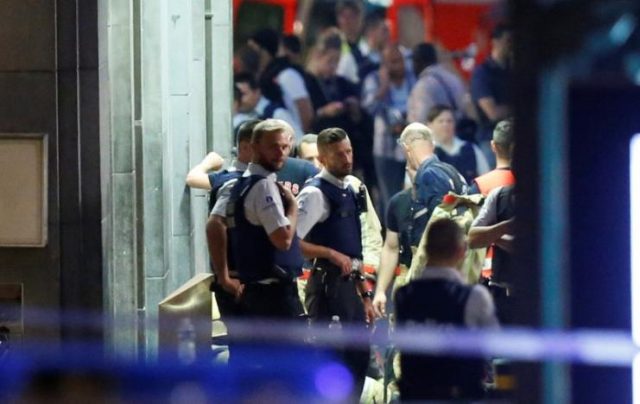
BRUSSELS — (UPDATE – 8:18 a.m.) Belgian troops shot dead a suspected suicide bomber in Brussels’ central train station on Tuesday but there were no other casualties, in what authorities were treating as the latest terrorist incident in Europe.
The man set off a small explosion at the city’s Central Station, prosecutors said, and was then shot by one of the routine military patrols active in Brussels since attacks more than a year ago. They declined comment on witness accounts that the man had shouted Islamist slogans first.
Only hours later, after bomb disposal teams had cleared the area, was the man confirmed dead. There was no word on his identity.
“We consider this a terrorist attack,” prosecutor Eric Van Der Sypt told reporters by the nearby Grand Place.
Police had cleared streets around Brussels’ landmark Renaissance town square after the blast, which occurred around 8:30 p.m. (1830 GMT) as tourists and locals were enjoying a hot summer’s night.
The Belgian capital, home to the headquarters of NATO and the European Union, has been on high alert since a Brussels-based Islamic State cell organized the attack that killed 130 people in Paris in November 2015. Four months later, associates of those attackers killed 32 people in their home city.
Since then, attacks in France, but also in Germany, Sweden and, most recently, in Britain, have been carried out in the name of the Syria-based Islamist group by other young men, many of them locals, raising fears of more violence in Brussels, where almost a quarter of its population of 1.2 million are Muslim.
Witnesses spoke of a man who shouted Islamist slogans, including “Allahu akbar” in an underground area of the station still busy with commuters making their way home and seemed to set off one or two small blasts that filled parts of the building with smoke.
‘Isolated acts’
Security experts said Tuesday’s incident could have been similar to “lone wolf” assaults carried out by radicalized individuals with limited access to weapons and training.
“Such isolated acts will continue in Brussels, in Paris and elsewhere. It’s inevitable,” Brussels security consultant Claude Moniquet, a former French agent, told broadcaster RTL.
With Islamic State under pressure in Syria — where Belgium has been the most fertile European recruiting ground for foreign Islamist fighters — he said attacks in Europe could increase, though many of these would be by “amateurs” doing little harm.
He compared Tuesday’s incident to that on Paris’ Champs-Elysees avenue a day earlier, when a man was killed when he rammed his car, filled with explosive and weapons, into a French police convoy. No one else was injured.
Nicolas Van Herrewegen, an employee at the Brussels Central Station, told Reuters that he was heading downstairs toward the underground platforms of the compact, 1930s station, which serves long-distance and suburban lines running under the city center.
“There was a man shouting, and shouting and shouting,” he said. “He was talking about the jihadists and all that and then at some point he shouted ‘Allahu akbar’ and blew up the little suitcase he had next to him. People just took off.”
He described the man as quite dark and with short hair and said he was wearing a white shirt and black jeans.
Remy Bonnaffe, a 23-year-old lawyer who was waiting on the concourse for a train home to Ghent, said he was startled by an explosion as he listened to music on his headphones. He took a photograph of flames shooting up from what he thought was a briefcase. There was a second blast further away, which he could not see, followed by what sounded like gunfire, prompting him to run.
“I think we had some luck tonight,” he told Reuters. “I’m happy that no one was injured and that this was basically a failed attempt.” People just feet from the explosion appeared unhurt and he said he saw no obvious damage to the walls around.
As Prime Minister Charles Michel consulted with his security advisers, the national alert was maintained at its second highest level. Michel, who convened a National Security Council meeting for early Wednesday, tweeted his thanks to the security forces and railway staff for their professionalism and courage.









